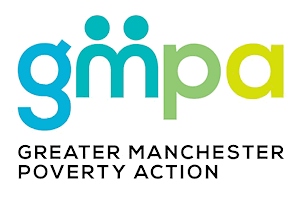New poverty monitor highlights stark inequalities across Greater Manchester
Date published: 21 August 2019

Greater Manchester Poverty Action
A new research tool developed by Greater Manchester Poverty Action (GMPA) has highlighted the huge disparities in living standards across the region.
It finds that people living in relatively affluent boroughs like Trafford and Stockport are more likely to do well at school, earn more at work and live longer than their counterparts in boroughs like Rochdale, Oldham, Salford and Tameside.
GMPA’s Mini Poverty Monitor details some of the most commonly used stats to understand poverty and living standards across each of Greater Manchester’s ten boroughs.
As a result, GMPA is calling on each of the ten local authorities and the Greater Manchester Combined Authority to develop robust anti-poverty strategies and appoint a lead for tackling poverty.
The aim is to support policy makers and organisations tackling poverty to better understand the nature of poverty across the region.
Drawing on a range of existing datasets, the monitor shows that:
- Child poverty is highest in Manchester at 45% and lowest in Trafford at 19%. In Rochdale, this is 33% - highest in central ward (57.4%) and lowest in Norden (23.2%).
- Workers living in Rochdale are paid on average £5 less per hour than workers in Trafford – less than both the averages across Greater Manchester and Great Britain
- A third of adults (32%) in Rochdale lack level 3 (equivalent to A-level) qualifications compared to 18% of adults in Trafford.
- People working in Rochdale are nearly three times more likely to be in jobs paying at or below the National Minimum Wage/National Living Wage than people working in Salford.
- The lowest rent in Greater Manchester can be found in Wigan and Rochdale with an average of £425 per month for a two-bedroom property.
- The life expectancy over Greater Manchester has markedly increased since 1991, but men and women in Rochdale experience some of the lowest life expectancies in the region.
- Men born in Rochdale can expect to live to 77. Men born in Stockport can expect to live to 80 (highest), compared to 76 in Manchester (lowest).
- Women born in Rochdale can expect to live to 81. Women born in Trafford can expect to live to 84 (highest), whilst their counterparts in Manchester can expect to live to 80 (lowest).
- School readiness amongst Rochdale boys and girls is below average. In Rochdale, just 56.8% of boys (compared to the England average of 63.2%) and 71.2% of girls (compared to the England average of 77.5%) are ready to attend school. School readiness for boys and girls is highest in Trafford, and lowest in Oldham.
Graham Whitham, Director of GMPA said: “The poverty monitor highlights some of the stark differences in the experiences of people living in different parts of Greater Manchester.
“It is wrong that your life chances should be determined by where you happen to be born and live.
“There are some exciting initiatives in different parts of Greater Manchester seeking to address poverty and give everyone a fair chance in life. A number of boroughs, including Salford and Manchester have anti-poverty strategies in place.
“We want to see these scaled up and replicated across the city region so that there is a united front against poverty across the whole of Greater Manchester.”
Councillor Sara Rowbotham, Rochdale Borough Council’s cabinet member for health and wellbeing, said: “The government’s austerity programme continues to have a devastating impact on residents across our borough, which is underlined by this important research.
“Central government has cut £178m from Rochdale Borough Council’s budget over the last 10 years and with more to follow, this has left the council running vital services on a shoestring.
“We work with our partners to provide a range of services and innovative policies to mitigate the damaging effects of these government cuts.
“However, until austerity policies are scrapped and the drastic cuts to council and public health budgets reversed, then our most vulnerable residents will suffer as health inequalities and poverty levels continue to increase.”
Do you have a story for us?
Let us know by emailing news@rochdaleonline.co.uk
All contact will be treated in confidence.
Most Viewed News Stories
- 1Newhey's Char Steakhouse and Bank Chamber close with immediate effect
- 2Royton haulage firm fined after Rochdale dad went to work and didn’t come home
- 3Six men arrested in Rochdale child exploitation investigation
- 4Two men arrested after police chase ends up in Middleton river
- 5Obituary: Jean Ashworth
To contact the Rochdale Online news desk, email news@rochdaleonline.co.uk or visit our news submission page.
To get the latest news on your desktop or mobile, follow Rochdale Online on Twitter and Facebook.


